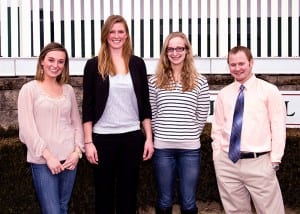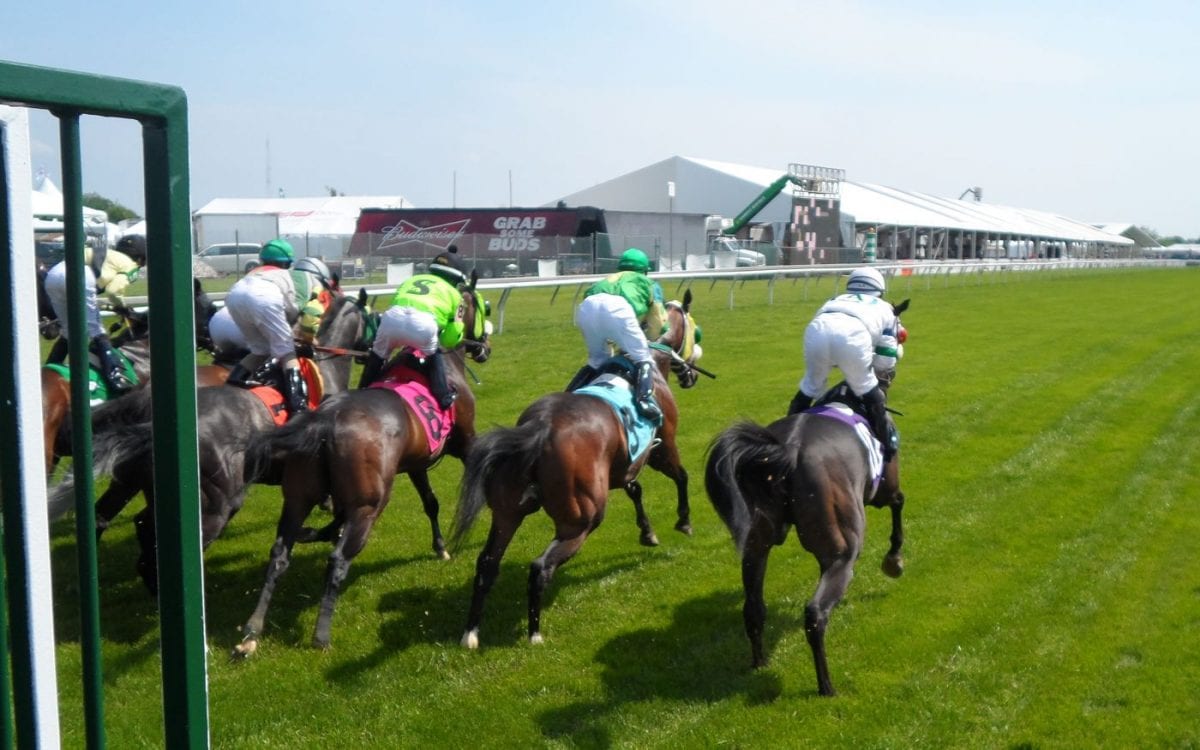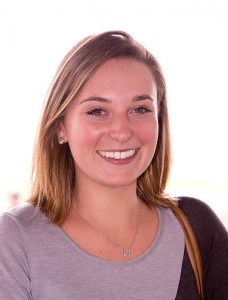by Teresa Genaro
A quick glance at the cast page for Horseplayers reveals that the lead characters don’t offer much in the way of diversity: six characters, six men, all white.
The target audience for the Esquire Network, on which the shows airs, is males in their late 20s to their early 40s, according to Tina Gazzero Clapp, president of GoGoLuckey, which produces the show. Guys with beards, she said – not beards like Duck Dynasty, but beards like Brooklyn hipsters. Or, not coincidentally, beards like several of the cast members often sport.
Racetracks, too, seems to see women as something other than bettors. When marketing initiatives are female-oriented, they’re about breast cancer and wearing pink and hats, not about handicapping and wagering strategy.
Nonetheless, despite obstacles, women are finding their way to the windows and showing off their handicapping chops.
One of those women is Gabby Gaudet, the Maryland Jockey Club’s race analyst. Gaudet, the child of retired trainer Eddie Gaudet and current trainer Linda Gaudet, appeared in the second episode of Horseplayers, observing the horses in the paddock for the Manhattan Handicap last Belmont Stakes day. As shown in the scene included in the show, Gaudet tells cast member Christian Hellmers that it’s important to take note of the trainers of the horses.
“They portrayed the women…interestingly, I guess you could say,” she said recently. “I edit my own videos, so I know what it consists of, but I was disappointed to see my clip.”
Cut, apparently, from Gaudet’s scene was her favorable analysis of a first-time U.S. starter for Chad Brown.
“I went through a whole physical description,” she said, “but all they used was, ‘pay attention to the trainer.’”
The horse Gaudet focused on was Real Solution. He was third that day, beaten less than two lengths at 7-1. Two months later, he won the Arlington Million.
Producer Gazzero Clapp said last month that she had approached several women about appearing in the show, but that none was available. One of those was Gaudet, who said that she declined the opportunity.
“I was just starting [at the Maryland Jockey Club],” she explained. “In fact, I hadn’t even started; I was still interning.”
She has, she said, no regrets about turning down the role, though she does wish that Horseplayers looked more like the racetrack at which she’s spent her whole life.
“Horse racing is such a diverse industry,” she said. “I’d have liked to see more women there.”
She also wishes that the show revealed more actual handicapping. Hellmers, she said, talked at length with her about his approach to handicapping a race, none of which has so far shown up in the broadcasts.
One fan of Gaudet’s appearance is Judy Wagner, who won the National Handicapping Championship in 2001 and finished second in the year-long NHC tour in 2010, the year her husband Brian won it. A regular tournament player, she’s faced her share of scorn from her male rivals, to whom she pays little heed.
“People have been very ugly to me,” she said frankly. “My husband walks more slowly than I do, and when I’m walking into a tournament and he comes in behind me, people have said, ‘Here comes the real handicapper now.’
“Other men have asked me whether he is the one who gives me my picks, and somebody called him once and asked if I really knew anything about horse racing.”
She also recalled a time when her home track, Fair Grounds, invited her to appear on its in-house handicapping show — until one of the male regulars refused to go on the air with a woman.
Were Wagner so inclined, she could point out to her critics that she qualified for the NHC before her husband did, and that she’s an 11-time qualifier for the biggest handicapping contest in the country.
While Wagner is enjoying Horseplayers, she, like Gaudet, wishes it showed more actual handicapping, and she wishes that the women in the show were portrayed more positively.
“I think they’ve dumbed them down,” she said, noting that Gaudet and HRTV’s Michelle Yu have been exceptions.
Another avid contest player, Emily Gullikson qualified for the Horseplayer World Series within months of beginning to play, finishing second. Though she rarely went to the races while growing up in Northern California, her family’s racing roots run deep: the family of her mother’s high school boyfriend owned Native Diver, and her great-grandfather worked for the Daily Racing Form.
[pullquote]“I love being a degenerate. It’s a badge of honor, but it doesn’t sell to women very well.”– Theresia Muller[/pullquote]A full-time psychology student who describes herself as “covered in tattoos,” she has had few negative experiences at the contest table or at the racetrack.
“At the first tournament I played,” she recounted, “I sat at a table and the other players looked at me as if I were lost, but I wasn’t uncomfortable or intimidated. I knew that’s where I was supposed to be.”
Gullikson is an athlete and competed in hunter/jumper classes when she was younger, and she observed that equestrian sports are one of the few in which women and men compete equally.
“Handicapping is the same,” she said. “There’s no feeling like, ‘I’ve got to step my game up, I’ve got to compete with the guys.’”
Both Gullikson and Wagner suggested that tracks could do a better job of presenting racing as a gambling opportunity in general, and specifically to women.
Theresia Muller, a portfolio manager who lives near Charlottesville, Virginia, shares that opinion, saying that racing is missing out on the opportunity to attract women as gamblers, observing that they represent a growth segment for an industry that could use more betting customers.
A serious horseplayer who also the treasurer of the Horseplayers Association of North America, Muller declined to make public her annual handle, but she did disclose that last year she cleared about $30,000—not bad for someone with a full-time day job.
“Horizontal exotics absorb more than 95% of my play,” she said, sharing that she’s hit more than a few Pick-6s, the two biggest of which paid nearly $20,000 each.
Because she likes to play exotics, contests don’t attract her. But, like the cast of the reality show, most of the people she observes at the track are men, from whom she has on more than one occasion received “smart-ass comments,” though she acknowledged that they come with less frequency than they used to.
“I’ve got a tough personality,” she said. “If you’re going to say negative things to me, downplaying my ability, you’re going to give me more of a challenge.”
[pullquote]“Racing is a tough game. It’s the same on the backside: you have to have thick skin and go along with it.”— Dylan Smith[/pullquote]
Though neither interested in contests nor intimidated by the overwhelmingly male atmosphere, Muller would nonetheless support an all-female handicapping contest, to encourage more women to play seriously.
“It would be a benefit for those who already like racing to see that it’s not just a bunch of grizzled old degenerates,” she said, hastening to add, “I love being a degenerate. It’s a badge of honor, but it doesn’t sell to women very well.”
Assistant trainer Dylan Smith has already proved her mettle in a world long dominated by men: the racetrack backstretch. Though female trainers, assistants, exercise riders, jockeys, grooms, and hotwalkers are hardly a rarity and command respect no less than their male counterparts do, women are nonetheless often in the minority—a situation reflected at the betting windows as well.
Smith, who works in the barn of trainer Richard Small, says she could read a program before she could read a book.
“My dad’s a big racing fan,” she said. “I got hooked pretty early on.”

Gabby Gaudet (left) and Dylan Smith (third from left) are among the women making their way in the wagering world. Photo by Jim McCue, Maryland Jockey Club.
She’s new to tournament play but is as interested in handicapping on the front side as she is in husbandry at the barns. Perhaps because she’s a member of the racetrack community, she hasn’t encountered the dismissive attitudes that Mueller talked about.
“I’ve never really been treated any differently because I’m a woman,” she said. “Or maybe I Just didn’t notice it.”
So far, she’s a fan of Horseplayers, though she wishes that the show conveyed how much time and work go into the betting on which the show focuses.
“If I’m not in the barn or with the horses, I’m at the track or home studying or watching races,” she said. “It’s a lifestyle pretty much; your world kind of revolves around it.”
She’s not particularly bothered by the absence of women on the show. “It’s how it is,” she said. “The majority of the gamblers are guys. I don’t think the show should represent how it’s not in real life.
She’s also not terribly enthusiastic about an all-female contest.
“I know I’m capable of playing with the boys,” she said. “There are plenty of guys out there I know that I can beat, and there are plenty of girls that can play right along with the guys. “
“Racing is a tough game,” she went on. “It’s the same on the backside: you have to have thick skin and go along with it.”
And go along with it they do, each successful on her own terms, each making a name for herself, some of them publicly, some more quietly. Gazzero Clapp said that she hoped that production of Horseplayers would continue beyond this first series, and perhaps a second season would offer a more diverse cast than the one showing up on our screens on Tuesday nights.
But even if it doesn’t, women handicappers and bettors will continue to make their presence felt where it really counts: at the contest table, and at the windows.
(Featured image by Teresa Genaro.)










Great article Nice Work!
Thanks, George–glad you liked it.
Horseplayers diversity issue is more than just women. I frequent different racetracks and play in many handicapping contests. The handicappers present are what former New York Mayor, David Dinkins, would call a gorgeous mosaic of race and religious faith, of national origin and sexual orientation. The winner of NHC II was female, the winner of NHC III was African-American and the recent winner of NHC XV was Latino. Hopefully season 2 of Horseplayers will better/fully embrace diversity.
For sure, Eddie, and this article started out as being about broader issues of diversity. When I started interviewing, though, we narrowed the focus because the women I was interviewing were so interested that we wanted to include them all. Quite possibly will revisit other types of diversity at another point, and thanks for pointing that out.
Nice article, Teresa!
Thanks, Joel–
The lack of diversity in the Horseplayers Series was the reason for my first reply, not your excellent article. I fully understand and empathize with your article.
There are many top notch female handicappers that I’ve had, and still have, the honor of competing against both online and in live handicapping tournaments.
Judy Wagner from Louisiana, Cara Yarusso from Minnesota, Stephanie Davis from New York, Lee Geraghty from California, Cheryl McIntyre from Ohio, Barbara Buckley from California, Diane McClyment from Maryland and Wendy Long from Canada are a few who come to mind.
The majority of these women, and others, have qualified numerous times for the NHC and HPWS and have consistently finished near the top of the leaderboard with Judy Wagner winning the NHC in 2001. Additionally, Wendy Long finished 5th in 2012 and 12th in 2013 in the Breeder’s Cup Betting Challenge.
As well as being excellent handicappers many of these women have extraordinary careers as Cara Yarusso is a chemical engineer with General Mills.
Sadly the top female handicapping contest players have the misfortune of being painted with the same brush as other women who are contestants “in name only”. Those are the women who are wives, daughters and sisters, etc. of other male players who do all of the handicapping. There is even a family from California who qualified their octogenarian grandmother and brought her to Las Vegas for the HPWS. I personally have no problem with this practice other than how it negatively impacts the true female handicappers and minimizes their accomplishments.
I am the youngest of 4 children with 3 sisters so my world view of women comes from a totally different perspective than many of my male counterparts on the handicapping contest circuit. Your article and others similar in nature will go a long way in shinning the spotlight on women handicappers, racing analysts, trainers and others women in the racing industry who don’t get the recognition and respect they truly deserve.
Ah, thanks for the clarification, Eddie. I heard similar things from some of the women, including what you said about the women at tournaments who were there essentially to give their husbands or male partners an extra spot.
I appreciate your mentioning some of the other women competitors, too.
I caught a couple of episodes yesterday and I enjoyed it. To be honest, I didn’t notice the lack of women. I am pretty used to it because on the track (backside and front)it is mainly men. I don’t mind, I’m kind of in my own little world when I am at the track anyway 🙂 I’d love to try a handicapping contest sometime even though I am a beginner, I think it would be fun!
I really enjoyed your article and got a good laugh remembering my first contest. It was HPWS and I was at the table with six men some of whom brought their girlfriends. They laughed at me telling them how I just started handicapping that year and won my way into the contest. It got quieter and quieter as the week-end went on and I finished 33rd out of 800 plus. I was the only one left playing at my table on Sunday. Now I mostly just handicap and play online, biggest win was on a $1 super hi five that paid over 50K for $2 bet. I feel confident in my abilities, but I think that most of the women I have met in handicapping are like me, quietly winning and winning. Would like to see a second season of Horseplayers with more in depth handicapping as well though. A bigger budget so they could intersperse some video of stallions whose progeny are winning (when they are talking about who they have picked for a race) would be nice. A comment from more trainers and jockeys would add depth as well.
Thanks for the comments, Terri and Christie. It seems obvious that there are loads of women who are serious handicappers–I’ve heard from a number since I wrote this. It’s too bad that tracks don’t seem to recognize that when they promote to women.